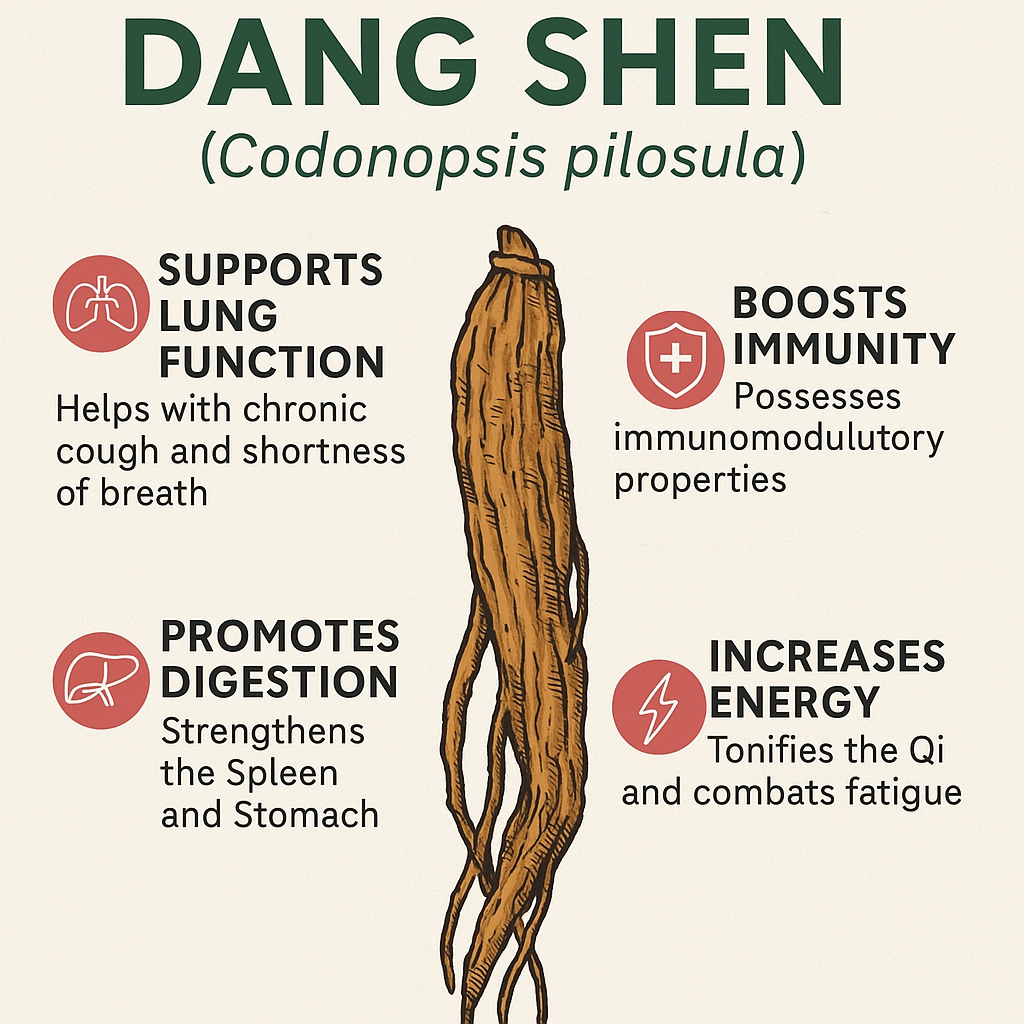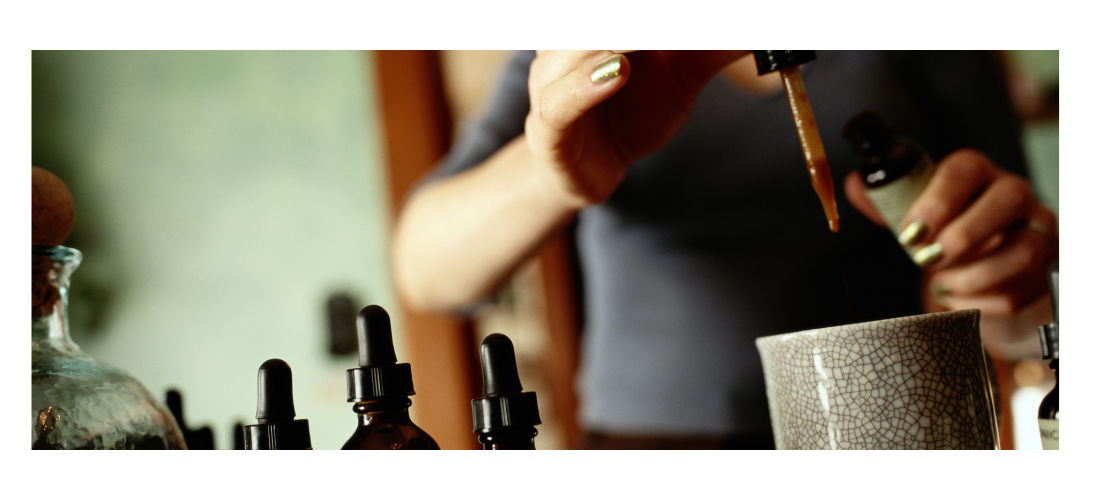

Read time: 3 minutes approximently
You probably didn’t land here searching for a slightly sweet root that looks like twisted licorice and works like ginseng—but here you are. And lucky for you, Dang Shen, also known as Codonopsis, has been the quiet powerhouse behind some of the most effective Traditional Chinese Medicine formulas for centuries.
Used to restore energy, support digestion, and strengthen lung function—especially after illness or burnout—Dang Shen is your go-to herb when you want real stamina without the crash. If you’ve been tired for no reason, constantly catching colds, or recovering from stress, this herb might be exactly what your body’s been asking for.
Let’s explore what makes Dang Shen so special—and how to use it effectively to recharge from the inside out.
Supports: Fatigue, immune health, lung function, digestion, post-illness recovery
TCM Name: Dang Shen (党参)
Category: Qi Tonic
Meridians: Lung, Spleen
How to Use: Tea, soup, decoction, tincture, smoothie
Works Well With: Huang Qi, Bai Zhu, Shu Di Huang, Goji Berries
 What Is Dang Shen?
What Is Dang Shen?If you’re constantly feeling wiped out—even after a full night’s sleep—or crashing hard after meals, dragging yourself through the afternoon, or struggling to bounce back from a cold or stressful event, Dang Shen might be the gentle powerhouse your body’s been silently asking for. In Traditional Chinese Medicine (TCM), this herb is a trusted Qi tonic, known for its ability to restore and sustain your body’s core energy—without being overly stimulating or harsh.
Nicknamed the “poor man’s ginseng,” Dang Shen (Codonopsis pilosula) offers many of the same benefits as Panax ginseng but in a milder, more balanced way. It strengthens the Spleen and Lung meridians, which are foundational in TCM for digestion, immunity, and the ability to generate and distribute energy. Unlike ginseng, which can be too intense for some people—especially those who are sensitive, prone to anxiety, or recovering from illness—Dang Shen is gentle enough for long-term use and is often used in convalescent formulas, postpartum recovery blends, and everyday wellness tonics.
Its naturally sweet, slightly earthy flavor makes it easy to incorporate into herbal soups, teas, or daily tonic blends. And whether you’re dealing with low energy, poor appetite, chronic fatigue, or lingering respiratory issues, Dang Shen delivers a slow, steady uplift—helping your body rebuild strength from the inside out.
It’s especially loved by:
Busy adults with stress fatigue
Those recovering from illness or surgery
People with poor appetite or digestion
Anyone prone to chronic colds or respiratory issues
Dang Shen belongs to the category of Qi tonics and is said to:
Strengthen Spleen Qi (digestive power)
Support Lung Qi (breathing, immune defense)
Generate fluids and support mild Yin deficiency
It’s most often used when you feel:
Tired even after sleeping
Bloated or sluggish after meals
Chronically run down or sick
Weak after antibiotics or COVID
| Benefit | Evidence |
|---|---|
| Immune Support | Polysaccharides boost macrophage & NK cell activity (PubMed: 28768841) |
| Anti-Fatigue | Shown to improve endurance and reduce oxidative stress (PubMed: 25662871) |
| Blood Sugar | Mild glucose-lowering effects in animal studies (PubMed: 23243464) |
| Digestive Support | Improves gut motility, appetite (TCM + emerging research) |

Check out our detailed page on How to use herbs
1. Decoction (Traditional):
Use 9–30g per day with other herbs
Simmer gently 30–60 mins with lid cracked
2. Slow Cooker Method:
Add to soup or bone broth with herbs like Huang Qi, Goji Berries, Shu Di Huang
3. Powder/Extract Capsules:
1–3g daily or per manufacturer dose
Add to smoothies or warm drinks
4. Tincture:
30–60 drops, 2x daily

You’ll Need:
15g Dang Shen
15g Huang Qi
10g Goji Berries
1 slice fresh ginger
1 chicken thigh or tofu block
6–8 cups water
Steps:
Simmer all ingredients for 1.5 hours. Drink warm. Nourishes Qi and fluids, ideal for fatigue and dry lungs.
| Feature | Dang Shen | Ren Shen |
|---|---|---|
| Energy Boost | Gentle, nourishing | Strong, stimulating |
| Long-Term Use | Yes | Best short-term |
| Cost | Affordable | Expensive |
| Ideal For | Sensitive or weak constitutions | Athletes, burnout |
| Side Effects | Rare | Can cause insomnia, agitation |
Conclusion: Dang Shen is ideal if you need slow, steady support without overdoing it.
Those with excess heat or dampness (consult a practitioner)
Avoid during active infections with high fever
Use caution if on diabetes or blood pressure meds—may enhance their effects
Pregnancy: Generally considered safe but consult your provider
Children: Safe in small doses for immune/digestive support
Q: What does Dang Shen taste like?
A: Slightly sweet, earthy, and mild—blends well in soups or with goji berries in tea.
Q: Can I use this in smoothies or coffee alternatives?
A: Yes! The powder blends beautifully with nut milks, cacao, or dandelion coffee.
Q: Is it OK with medications?
A: Usually yes, but check with your doctor if you’re on insulin, immune drugs, or blood thinners.
Q: How do I know I’m getting real Dang Shen?
A: Look for:
Pale tan color, twisted root shape
Lightly sweet smell
GMP-tested for purity
Sourced from trusted farms (like ours!)
Q: How long until I feel results?
A: Many feel more energy within 1–2 weeks of consistent use, especially when taken as part of a daily soup or tonic blend.
"I used to crash hard by 2pm. After adding Dang Shen and Huang Qi to my morning tea, my energy is steadier—and I haven’t caught a cold all winter."
—Mara J., Portland OR
Skip mystery sellers. Our Dang Shen is:
Ethically sourced
Lab-tested
GMP-certified
Whole root or powder available
Shop Dang Shen Now at 1st Chinese Herbs
Dang Shen isn’t flashy. But it’s a quiet powerhouse—perfect when you need reliable energy, immune support, and recovery without crashing later. Think of it as your herbal battery charger: steady, nourishing, and always there when life runs low.
References
Polysaccharides from Radix Codonopsis improve T-cell balance in immunosuppressed mice
Study: Mice pretreated with Codonopsis polysaccharides showed healthier T‑cell ratios (CD4+/CD8+, Th1/Th2, Treg/Th17) and stabilized cytokine levels after hydrocortisone-induced immune suppression pmc.ncbi.nlm.nih.gov+15pubmed.ncbi.nlm.nih.gov+15pmc.ncbi.nlm.nih.gov+15.
PMID: 30797152
Link: https://pubmed.ncbi.nlm.nih.gov/30797152
Codonopsis polysaccharides protect against immunosuppressant damage in mice
Study: After chemotherapy-like immunosuppression (cyclophosphamide), polysaccharide-treated mice had normal spleen size, balanced cytokine levels (IFN-γ, IL‑2, IL‑10), and improved intestinal IgA and Lactobacillus levels pubmed.ncbi.nlm.nih.govpubmed.ncbi.nlm.nih.gov+1pmc.ncbi.nlm.nih.gov+1.
PMID: 30037030 (for effects on small intestine)
PMCID: PMC6100181
Polysaccharides and oligosaccharides enhance endurance and stress resistance
Study: Mice given Codonopsis extracts (polysaccharides, oligosaccharides) showed significantly longer swimming time, higher liver/muscle glycogen, reduced fatigue metabolites, and better antioxidant markers pubmed.ncbi.nlm.nih.gov+2pubmed.ncbi.nlm.nih.gov+2pmc.ncbi.nlm.nih.gov+2pmc.ncbi.nlm.nih.gov+7pubmed.ncbi.nlm.nih.gov+7pmc.ncbi.nlm.nih.gov+7.
PMID: 32608442
Codonopsis-derived polysaccharide reduces post-meal blood glucose
Study: Polysaccharide extracted from Codonopsis reduced oxidative stress and improved insulin secretion in vitro and lowered blood sugar in diabetic mice .
PMID: 30007607 (polysaccharide structure/hypoglycemic effect)
PMID: 35147627 (α‑glucosidase inhibition, in vitro and in vivo)
New analysis shows structure-function link in immune response
Study: Researchers fractionated polysaccharides, finding that certain chain structures correlate with stronger immunomodulatory signaling (TNF‑α, IL‑1β production in THP‑1 cells) pmc.ncbi.nlm.nih.gov+6pubmed.ncbi.nlm.nih.gov+6pubmed.ncbi.nlm.nih.gov+6pubmed.ncbi.nlm.nih.gov.
PMID: 39450708
Comprehensive review of Codonopsis polysaccharides
Compiles evidence for immune support, anti‑tumor, antioxidant, neuroprotective, antiviral, digestive, liver/kidney protection, hypoxia resistance, and prebiotic actions researchgate.net+2pubmed.ncbi.nlm.nih.gov+2pmc.ncbi.nlm.nih.gov+2.
PMID: 33766352